|
|
|
Sort Order |
|
|
|
Items / Page
|
|
|
|
|
|
|
| Srl | Item |
| 1 |
ID:
152325
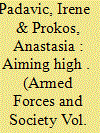

|
|
|
|
|
| Summary/Abstract |
This study investigates how veteran status influences earnings for working-age American women. Recent increases in women’s participation in the U.S. military mean that the proportion of female veterans is rising and is forecast to increase over the next 30 years. Yet we still know relatively little about the relationship between women’s military experience and later labor-market outcomes. Drawing on American Community Survey data from 2008 to 2010 and employing a new set of occupational categories better suited to veterans, we investigate how occupation and race/ethnicity influence the effect of veteran status on women’s earnings. Findings corroborate previous support for the “bridging hypothesis” in two ways. First, veterans are overrepresented in higher paying occupations and underrepresented in the lowest paying ones, partially accounting for their higher earnings. Second, military experience particularly enhances the earnings of disadvantaged race/ethnic minority women.
|
|
|
|
|
|
|
|
|
|
|
|
|
|
|
|
| 2 |
ID:
152322
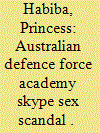

|
|
|
|
|
| Summary/Abstract |
In 2011, the Australian Defence Force Academy became embroiled in a sex scandal when a cadet made public, claims of abuse. Her claims led to a number of inquiries, which unveiled many other historical abuse claims. As such, this case revealed some of the potential problems associated with the containment of such disputes. To explore this further, a brief review of workplace changes (1930–present) was conducted, which highlighted the development of current containment measures. This was followed by a two-pronged case analysis of the 2011 Australian Defence Force Academy Skype sex scandal. Boltanski’s process theory was used in conjunction with Bourdieu’s field theory to study the containment of the case. Combined, these analyses revealed that, while a focus on the central players and their relations as psychologized/personal is a main strategy for containment, this approach can deflect attention from other factors that play important roles, resulting in more significant, far-reaching problems.
|
|
|
|
|
|
|
|
|
|
|
|
|
|
|
|
| 3 |
ID:
152319
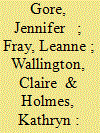

|
|
|
|
|
| Summary/Abstract |
Modern military organizations are making a concerted effort to recruit a more diverse range of people, with the role of women in the military at the forefront of debate. In Australia, in response to the changing role of the military and with the aim of positioning the military as an “employer of choice” for women, females are targeted as early as high school. Using data from a study of 6,492 Australian school students in Years 3–12, we examine student aspirations for military careers. Student aspirations were influenced by traditional perceptions of the military as a primarily masculine enterprise. Key reasons for student interest included dominant notions of masculinity, familial military experience, career options, and enlistment benefits. We argue that current views of the military among school children signal the need to shift such perceptions to appeal to a wider range of people and attract a more diverse workforce.
|
|
|
|
|
|
|
|
|
|
|
|
|
|
|
|
| 4 |
ID:
152317
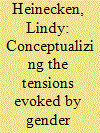

|
|
|
|
|
| Summary/Abstract |
The South African military has adopted an assertive affirmative action campaign to ensure that women are represented across all ranks and branches. This has brought about new tensions in terms of gender integration, related to issues of equal opportunities and meritocracy as well as the accommodation of gender difference and alternative values. The argument is made that the management of gender integration from a gender-neutral perspective cannot bring about gender equality, as it obliges women to conform to and assimilate masculine traits. This affects women’s ability to function as equals, especially where feminine traits are not valued, where militarized masculinities are privileged and where women are othered in ways that contribute to their subordination. Under such conditions, it is exceedingly difficult for women to bring about a more androgynous military culture espoused by gender mainstreaming initiatives and necessary for the type of missions military personnel are engaged in today.
|
|
|
|
|
|
|
|
|
|
|
|
|
|
|
|
| 5 |
ID:
152321
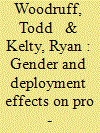

|
|
|
|
|
| Summary/Abstract |
This study examines whether gender moderates the relationships between deployment and both organizational identification and pro-organizational behaviors. The broader context motivating this study is the U.S. military’s 2016 rescission of the ground combat exclusion, accomplishing full gender integration in the armed forces. Structural equation modeling is used to test for gender moderation effects. Results reveal deployment frequency, but not current deployment, has small effects on several pro-organizational behaviors. Results also show that gender does not moderate the effects of deployment frequency on soldiers’ perceptions of the organization or economic or social satisfaction. Gender does moderate the effects of deployment frequency on soldiers’ identification with the army. Additionally, while gender was not found to moderate the relationship between combat deployments and overall pro-organizational behaviors among soldiers, it does moderate the effect of deployments on one pro-organizational item: sacrificing behavior. Implications are discussed with an eye toward full gender inclusion in the U.S. military.
|
|
|
|
|
|
|
|
|
|
|
|
|
|
|
|
| 6 |
ID:
152320
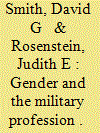

|
|
|
|
|
| Summary/Abstract |
As increasing numbers of women are recruited into the U.S. Navy, retention of women (especially in combat occupational specialties) lags behind men. Data indicate that women and men leave the Navy because of impact on their family. Lack of career persistence for women in nontraditional professions such as science, technology, engineering, and math professions has also been attributed to social psychological factors including self-efficacy, stereotype threat, and bias. We build on this research to examine the military and service academies’ socialization of women into a traditionally male profession through role model influence. Surveys were collected from students at the U.S. Naval Academy (USNA) on their work–family expectations. Results show a gendered difference in career intentions and influences by male and female non-USNA peers, but not from their families or officers. Expected work–family conflict, gender ideology, and family formation intentions were employed to explore relationships between work and family expectations.
|
|
|
|
|
|
|
|
|
|
|
|
|
|
|
|
| 7 |
ID:
152318


|
|
|
|
|
| Summary/Abstract |
This article considers the experiences of 12 U.S. Army women combat veterans. These women served in historically significant roles as some of the first women to officially serve in combat in the U.S. military. This article focuses on the role of gender in these women’s experiences in the context of the masculine culture of the military. We explore how they used performance of masculinity and metaphors of family to fit into their combat units. We also deliberate on how sexual harassment was used against these women in ways that communicated that they were not fully accepted. Finally, we consider the tension between empowerment and disempowerment in these women’s narratives of their military service.
|
|
|
|
|
|
|
|
|
|
|
|
|
|
|
|
| 8 |
ID:
152323


|
|
|
|
|
| Summary/Abstract |
U.S. service women were exposed to more combat-related trauma in recent wars compared to prior conflicts and consequently faced an increased risk of trauma-related mental health outcomes. In this study, we examined gender by race differences in self-reported post-traumatic stress disorder (PTSD) symptoms and clinician diagnoses in a large sample of U.S. Black and White service men and women returning from Iraq and Afghanistan, to determine whether women overall and Black women in particular are at an increased risk of PTSD compared to Black and White men. Using three PTSD measures—two symptom-based measures assessed at different times and one diagnosis measure—we found more traumatic combat exposures were associated with higher PTSD risk for service women compared to service men, but there was no additional increase in risk of PTSD for Black females.
|
|
|
|
|
|
|
|
|
|
|
|
|
|
|
|
| 9 |
ID:
152316
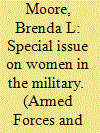

|
|
|
|
|
| Summary/Abstract |
This Armed Forces & Society issue is on women in the contemporary armed forces in the United States and other nations to include the South African National Defense Force and the Australian Defense Force. This issue contains a collection of nine papers, each reviewing a current aspect of women serving in the military since the post–Vietnam War Era. There are also two review essays of Megan Mackenzie’s book, Beyond the Band of Brothers: The US Military and the Myth That Women Can’t Fight. An overview of changing laws and the expanding role of women in the military is provided in this introduction, as well as summaries of the nine articles, and comments on the two book reviews mentioned above.
|
|
|
|
|
|
|
|
|
|
|
|
|
|
|
|
| 10 |
ID:
152324


|
|
|
|
|
| Summary/Abstract |
This study contributes to the growing body of literature about women veterans of the U.S. military by investigating how veteran status and disability are related to women’s ability to work. The study uses nationally representative data to analyze labor market outcomes of women who served in the U.S. military since 1973, with a focus on findings about women who have served since 2001. Results indicate women who served after 2001 are more likely to have a disability when compared to men veterans and women nonveterans. Those women veterans who do not have a disability are more likely to be employed than their nonveteran counterparts, net of controls for demographic factors. Disability, including service-related disability, is strongly related to unemployment and being out of the labor force. The discussion considers the implications of women’s military service for their ability to work.
|
|
|
|
|
|
|
|
|
|
|
|
|
|
|
|
|
|
|
|
|